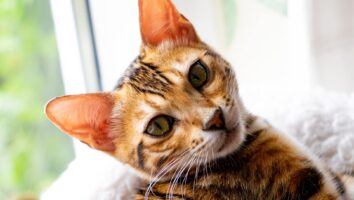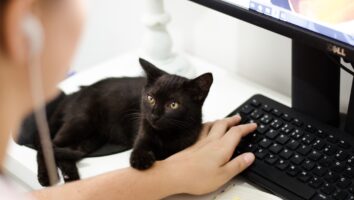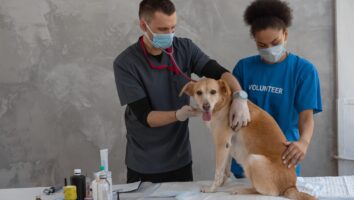Cat
What causes hair loss in cats?
Abnormal hair loss, medically known as alopecia, is a common dermatological problem in cats. The extent of hair loss varies depending on the cause and severity of the condition. Some conditions…
How to Bathe Your Cat at Home
Cats don’t need to be bathed routinely. Most cats groom themselves regularly and do such a great job that we don’t have to worry about bathing them. A cat’s tongue is covered with tiny spikes,…
Common Causes of Stomach Upset (Gastritis) in Cats
When people experience stomach upset, it can easily be identified and treated with over-the-counter medicines. Once symptoms start to appear, even mild ones, any person can easily communicate what…
10 Cool and Interesting Facts About Your Cat’s Ears
Cats' triangular-shaped ears clearly distinguish them from other species, but there’s a lot more to a cat’s pyramid-shaped ears than meets the eye! Keep reading to learn what makes your cat’s ears…
Vacationing with Pets: A Guide to Pet Sitting
Vacation season is officially upon us, but for many pet owners, finding reliable pet care can be astressful part of planning a vacation.If like many pet owners, you’ve decided that your pets need an…
Why is my cat itchy?
Itchy skin can be very frustrating for cats. To find relief, they engage in excessive grooming, licking, and scratching at the affected areas until there is hair loss and the skin becomes raw. When…
Eye Tests for Pets: Fluorescein Staining, Schirmer Tear Test, and Tonometry
Eye injuries are common problems in pets. An eye problem such as glaucoma, corneal ulcer, or uveitis, can be extremely painful for your dog or cat. Early diagnosis and treatment are crucial in…
Why does my pet need x-rays?
For decades, radiographs, commonly known as x-rays, have been the most common form of medical imaging used by veterinarians. Like other medical imaging techniques, radiographs are non-invasive,…
Why does my pet need a chemistry panel?
Blood work is a basic diagnostic tool in veterinary medicine. When your vet says your pet needs some blood work, it usually means a combination of a complete blood count (CBC) and a blood chemical…
Feline Infectious Anemia
Feline Infectious Anemia is caused by a group of bacteria called mycoplasma, that attach to the surface of red blood cells. Fighting between cats, mosquitos, ticks, and fleas are all thought to be…
Saddle Thrombus in Cats
Saddle thrombus, or Aortic Thromboembolism (ATE), in cats is the term used when a blood clot gets lodged in the main artery in the body, the aorta. These clots can also get stuck in other arteries,…
Common Diseases in Cats
You love your cat and want to take the best possible care of them, but it can be difficult to know what to monitor for or expect. Like most things in life, there isn’t an easy answer, but let’s…
Why is my cat panting?
Panting is defined as a rapid, short, breathing pattern, usually done with an open mouth. Panting in dogs is often considered normal and isn’t usually a cause for concern. In cats, however, panting…
How to Clean Your Cat's Ears
Most cats don’t need regular ear cleaning. But some feline breeds are more prone to the build-up of ear wax and/or ear infections. Cats with underlying health issues, such as allergies, diabetes, or…
Common Causes of Itchy Ears in Cats
Cats may scratch at their ears occasionally, but when you notice your cat scratching and pawing at her ears a bit more than usual, you should take a closer look. Are there any noticeable changes in…
Pet Medication 101: Trazodone
It’s important to understand a medication’s uses and side effects before giving it to your pet. This medication info sheet is meant to give you a good understanding of what trazodone (Desyrel) is…
Causes of Cardiomyopathy in Cats
Cardiomyopathy is a group of diseases that affect the muscles of the heart. It is the most common form of heart disease diagnosed in cats and the most common cause of heart failure. Continue reading…
7 Tips to Prepare for Your Pet’s First Vet Visit
The first visit to the vet can be nerve-wracking both for you and your pet. It’s only natural for them to be nervous. Your furry friend doesn’t understand the point of a veterinary visit. But you…
























